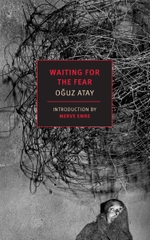A giant of modern Turkish literature, Oğuz Atay remains largely untranslated into English. First published in 1975, Waiting for the Fear is Atay's only collection of short stories, praised by the Nobel Prize winner Orhan Pamuk for having transformed the art of short fiction.
Atay's stories are vivid with life's absurdities and psychologically true to life, while his characters, oddballs and losers all, are utterly individual. A brilliant examiner of the inner life, Atay is no less aware of the flawed social world in which his people struggle to make their way, and he is exceptionally attuned to the strange power storytelling itself can exert over fate. In the title story, a nameless young man returns to his home on the outskirts of an enormous nameless city to discover that he has received a letter in a language he neither knows nor recognizes—after which, step by step, the inscrutable missive reshapes his world. In "Railroad Storytellers: A Dream," a professional story peddler lives in a hut beside a train station in a country that is at war—unless it isn't. He can't remember. What do such life and death realities matter, however, so long as there are stories to tell?
Ralph Hubbell's fluent and vigorous English rendering of this key work of world literature is a revelation.
Astonishing, deeply wry ... a collection of eight short stories by one of the most influential and inventive Turkish writers of the 20th century, Oguz Atay. These linguistically playful, slightly surreal stories, written in the 1970s, center on the down-and-out misfits and oddballs who struggle to connect with the rest of society.
—Ayten Tartici, The New York Times
Turkish writer Atay makes his English-language debut with this alluring 1975 collection, sharply translated by Hubbell, of dreamlike fables and horror stories…. Devotees of modernist literature will be grateful for Atay’s hypnotic and intense writing.
—Publishers Weekly
The eight exquisite stories in Waiting for the Fear are a perfect introduction to Oğuz Atay's world.
—Oğuz Demiralp
Much like a fire or a sinkhole, Atay himself was an unforgiving force of nature. Rejecting both the nostalgic allure of the past and the vacuous imitation of the present, his writing sought to transform the literary conventions of his era.
—Eamon Mcgrath LA Review of Books
This fear remains a defining feature of Turkish culture and politics…. I felt grateful to Atay for articulating its centrality and pervasiveness so many years ago.
-Kaya Genc, The Point


